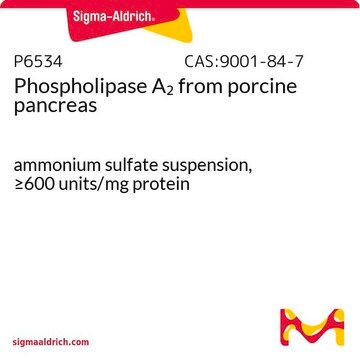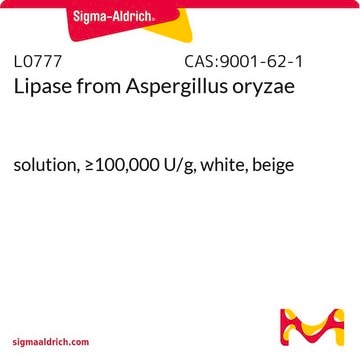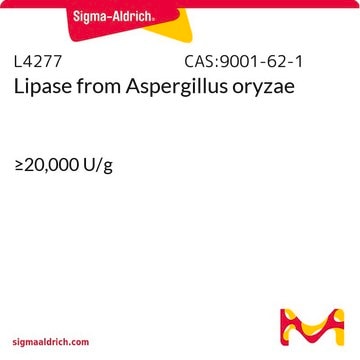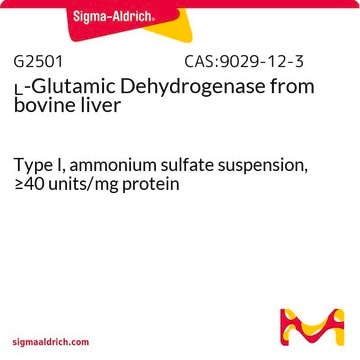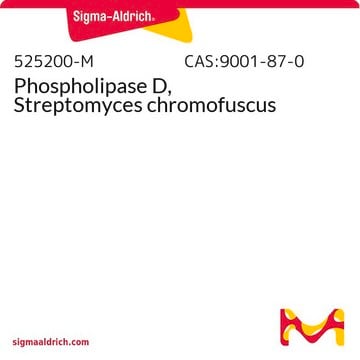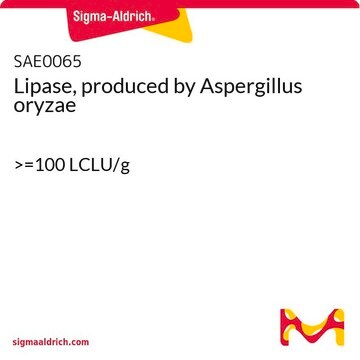L3295
Phospholipase A1 from Aspergillus oryzae
Sinónimos:
Lecitase™ Ultra, PLA1
Iniciar sesiónpara Ver la Fijación de precios por contrato y de la organización
About This Item
MDL number:
UNSPSC Code:
12352204
NACRES:
NA.54
Productos recomendados
recombinant
expressed in Aspergillus oryzae
form
liquid
specific activity
≥10 KLU/g
storage temp.
2-8°C
General description
Phospholipase A1 (PLA1) catalyzes the hydrolysis of acyl group from position 1 of lecithin to yield lysolecithin. It is expressed in a wide range of organisms such as rat platelets, bovine brain and testis, hornet venom, bonito muscle and fungi. Gene coding for PLA1 consists of four exons and three short introns spanning 1,056bp of genomic DNA. Mature protein contains 269 aminoacids and two possible N-glycosylation sites (Asn27 and Asn55).
Application
Phospholipase A1 from Aspergillus oryzae has been used:
- in the preparation of sn-1 and sn-2 C18:1- lysophosphatidylcholine (LPC) regioisomer standards
- as a catalyst for the synthesis 6-O-glucosyl-poly(3-hydroxyalkanoates) in a micro-aqueous system
- to catalyze the synthesis of methyl butanoate and methyl benzoate flavor esters in continuous flow microreactor
- to hydrolyze 17:0 phosphocholine (PC)
Analysis Note
minimum activity 10 KLU/G liquid
Legal Information
Lecitase is a trademark of Novozymes Corp.
signalword
Danger
hcodes
pcodes
Hazard Classifications
Resp. Sens. 1
Storage Class
10 - Combustible liquids
wgk_germany
WGK 1
flash_point_f
Not applicable
flash_point_c
Not applicable
Certificados de análisis (COA)
Busque Certificados de análisis (COA) introduciendo el número de lote del producto. Los números de lote se encuentran en la etiqueta del producto después de las palabras «Lot» o «Batch»
¿Ya tiene este producto?
Encuentre la documentación para los productos que ha comprado recientemente en la Biblioteca de documentos.
Los clientes también vieron
Specific enrichment of 2-arachidonoyl-lysophosphatidylcholine in carotid atheroma plaque from type 2 diabetic patients
Menegaut L, et al.
Atherosclerosis, 251(1), 339-347 (2016)
Thermomyces lanuginosus lipase-catalyzed synthesis of natural flavor esters in a continuous flow microreactor
Gumel AM and Annuar MSM
3 Biotech, 6(1), 24-24 (2016)
Jonah E Zarrow et al.
Journal of lipid research, 63(1), 100156-100156 (2021-11-30)
N-acyl-phosphatidylethanolamine (NAPE)-hydrolyzing phospholipase D (NAPE-PLD) is a zinc metallohydrolase enzyme that converts NAPEs to bioactive N-acyl-ethanolamides. Altered NAPE-PLD activity may contribute to pathogenesis of obesity, diabetes, atherosclerosis, and neurological diseases. Selective measurement of NAPE-PLD activity is challenging, however, because of
Nicole A Housley et al.
Journal of bacteriology, 193(18), 4634-4642 (2011-07-19)
Here we have characterized the Rickettsia prowazekii RP534 protein, a homologue of the Pseudomonas aeruginosa ExoU phospholipase A (PLA) secreted cytotoxin. Our studies showed that purified recombinant RP534 PLA possessed the predicted PLA(2) and lyso-PLA(2) activities based on what has
S G Monic et al.
Scientific reports, 12(1), 4766-4766 (2022-03-21)
Phospholipases are esterases involved in lipid catabolism. In pathogenic micro-organisms (bacteria, fungi, parasites) they often play a critical role in virulence and pathogenicity. A few phospholipases (PL) have been characterised so far at the gene and protein level in unicellular
Nuestro equipo de científicos tiene experiencia en todas las áreas de investigación: Ciencias de la vida, Ciencia de los materiales, Síntesis química, Cromatografía, Analítica y muchas otras.
Póngase en contacto con el Servicio técnico